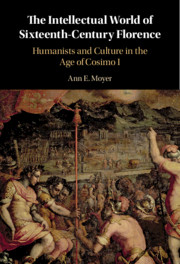Book contents
- The Intellectual World of Sixteenth-Century Florence
- The Intellectual World of Sixteenth-Century Florence
- Copyright page
- Contents
- Illustrations
- Preface
- 1 Florence and Cosimo
- 2 Who Were the Florentines? Etruscan Roots
- 3 Florentine Histories
- 4 Language and Its Study
- 5 Philological Approaches
- 6 Writing about the Arts
- 7 Florentine Customs and Practices
- 8 Conclusions
- Works Consulted
- Index
4 - Language and Its Study
Published online by Cambridge University Press: 15 July 2020
- The Intellectual World of Sixteenth-Century Florence
- The Intellectual World of Sixteenth-Century Florence
- Copyright page
- Contents
- Illustrations
- Preface
- 1 Florence and Cosimo
- 2 Who Were the Florentines? Etruscan Roots
- 3 Florentine Histories
- 4 Language and Its Study
- 5 Philological Approaches
- 6 Writing about the Arts
- 7 Florentine Customs and Practices
- 8 Conclusions
- Works Consulted
- Index
Summary
The vernacular language was a topic of great interest across Italy throughout the sixteenth century; most were interested in setting standards of good writing based on the models of Petrarch and Boccaccio as promoted by Pietro Bembo. Florentines differed especially in that they came to distinguish literary style from the language itself, and focused on the study of language. They modified the tools of humanistic study, developed for Latin and Greek, by distinguishing between the study of living languages and dead ones, sinceliving languages constantly undergo change and development. They also used a biological model, arguing that a language is like a living thing with its own life cycle. Most Florentine writings from the 1540s and 1550s came from a circle of friends who often collaborated with one another: Pierfrancesco Giambullari, Giovan Battista Gelli, Cosimo Bartoli, Carlo Lenzoni, and Giovanni Norchiati. Although they are now best known for their arguments about the history of the language, in fact they devoted many years to the study of modern language practice.
- Type
- Chapter
- Information
- The Intellectual World of Sixteenth-Century FlorenceHumanists and Culture in the Age of Cosimo I, pp. 123 - 174Publisher: Cambridge University PressPrint publication year: 2020

